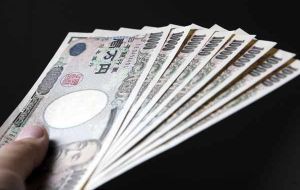MercoPress. South Atlantic News Agency
Uruguay to begin marketing sale of 10-year Samurai bonds
 Bonds are being offered at between 42 basis points and 48 basis points more than the Yen swap rate.
Bonds are being offered at between 42 basis points and 48 basis points more than the Yen swap rate. Uruguay started marketing a sale of 10-year Samurai bonds guaranteed by the Japan Bank for International Cooperation, according to reports in the Montevideo and Tokyo financial press.
Mercosur member Uruguay is offering the notes to investors to yield between 42 basis points and 48 basis points more than the Yen swap rate. Daiwa Securities Capital Markets Co. and Nomura Securities Co. are helping to arrange the sale that’s planned for next week.
Overseas borrowers have raised 899.7 billion yen (11 billion USD) this year from the sale of Samurai bonds, or Yen-denominated notes sold in Japan by non-Japanese issuers, according to data compiled by Bloomberg-Tokyo. That’s 80% more than the same period a year ago, even after a magnitude-9 earthquake and tsunami on March 11 shut the market for two months, the data show.
“Demand should be strong as the Samurai investor base is expanding,” Fumihito Gotoh, head of Japan credit research at UBS Securities Japan Ltd. in Tokyo, said. “With yields on domestic corporate bonds so low, investors are turning to Samurai bonds”.
The extra yield investors demand to own Samurai debt instead of similar-maturity Japanese government bonds dropped to 81 basis points Monday from 92 basis points April 1, according to a Nomura index. The spread on Japanese corporate bonds was last at 54 basis points, or 0.54 percentage point, a separate Nomura index shows.
Turkey sold 180 billion Yen of 10-year, 1.87% bonds on March 11 with backing from Japan’s state-run lender at 48 basis points more than the Yen swap rate. Export-Import Bank of India paid a 47 basis-point spread on 1.88% notes due 2021 and Panama paid a 48 basis-point spread on Jan. 18, the data show.
Uruguay is rated Ba1 by Moody’s Investors Service, the risk assessor’s highest non-investment grade, while JBIC is ranked Aa2, the third-highest investment grade.
A report on Uruguay from Nomura Securities International states that the country is likely on track to obtain an investment-grade credit rating next year.
“With a credible fiscal anchor as well as strong and balanced growth, Uruguay is en route to reduce dollarization and therefore achieve an investment grade credit rating some time in 2012” Nomura analyst Benito Berber said in a report released Monday.
Nomura expects Uruguay's economy to expand 5.5% this year on the back of strong private consumption and investment after growing at a strong 8.5% pace in 2010.




Top Comments
Disclaimer & comment rulesCommenting for this story is now closed.
If you have a Facebook account, become a fan and comment on our Facebook Page!